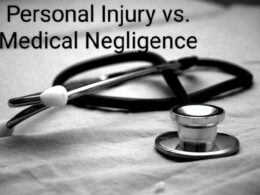If you or a loved one has been the victim of medical negligence, you may wonder how long you must file a claim. The answer varies depending on where you live and the circumstances of your case. In most states, there is a statute of limitations that sets a deadline for filing a medical malpractice lawsuit.
The statute of limitations typically ranges from two to five years from when the malpractice occurred or when you discovered the injury.
However, there are exceptions to this rule, such as the “discovery of harm” rule, which allows you to file a claim after the standard statute of limitations has expired if you didn’t discover the injury until later.
It’s important to understand the laws in your state and consult with an experienced medical malpractice attorney to determine your legal options.
Filing a medical malpractice claim can be a complex and time-sensitive process. It’s crucial to act quickly and seek legal guidance as soon as possible. Waiting too long to file a claim can result in losing your right to seek compensation for your injuries. Understanding the statute of limitations and other legal requirements is essential to protecting your rights and pursuing justice.
Understanding Medical Negligence Claims
Before we get into how long can you go back to claim medical negligence, let’s first understand what medical negligence is and the different types of medical negligence.
What is Medical Negligence?
Medical negligence occurs when a healthcare provider fails to provide the standard of care that a reasonable and prudent healthcare provider would have provided under similar circumstances. In other words, medical negligence is a breach of the professional duty of care owed by a healthcare provider to their patient.
Medical negligence can occur in many different ways, including misdiagnosis, delayed diagnosis, surgical errors, medication errors, and failure to diagnose. When medical negligence results in harm to a patient, the patient may be entitled to compensation through a medical negligence claim.
Types of Medical Negligence
There are many different types of medical negligence, but some of the most common include:
- Misdiagnosis: When a healthcare provider fails to diagnose a medical condition or provides an incorrect diagnosis.
- Delayed Diagnosis: When a healthcare provider fails to diagnose a medical condition in a timely manner, resulting in harm to the patient.
- Surgical Errors: When a healthcare provider makes an error during a surgical procedure, such as operating on the wrong body part.
- Medication Errors: When a healthcare provider prescribes the wrong medication or the wrong dosage of medication.
- Failure to Diagnose: When a healthcare provider fails to diagnose a medical condition, resulting in harm to the patient.
When pursuing a medical negligence claim, it is important to have access to your medical records and to work with an experienced attorney who can help you navigate the legal process. The statute of limitations for medical negligence claims varies by state, so it is important to act quickly if you believe you have been the victim of medical negligence.
Time Limits for Filing a Medical Negligence Claim
If you have been a victim of medical negligence, you may have the right to file a claim to seek compensation for your damages. However, you need to be aware of the time limits for filing a medical negligence claim, as they vary by state and can be strict. In this section, we will discuss the different time limits and rules that apply to medical negligence claims.
Statute of Limitations
The statute of limitations is the time limit set by law for filing a medical negligence claim. It varies by state, and you need to be aware of the statute of limitations in your state. In most states, the standard statute of limitations for medical negligence claims is two to three years from the date of the injury or discovery of the injury.
For example, in Alabama, the statute of limitations is two years from the date of the injury or discovery of the injury.
Discovery Rule
The discovery rule is an exception to the statute of limitations that applies in some states. Under the discovery rule, the statute of limitations starts running from the date the injury was discovered or should have been discovered, rather than from the date of the injury itself.
This rule applies when the injury is not immediately apparent, such as in cases of misdiagnosis or delayed diagnosis. However, the discovery rule is not available in all states, and the rules vary by state.
Exceptions to the Statute of Limitations
There are some exceptions to the statute of limitations that may allow you to file a medical negligence claim even if the time limit has expired. These exceptions include:
- Minority: If the victim was a minor at the time of the injury, the statute of limitations may be extended. The time limit may not start running until the minor reaches the age of majority.
- Mental incapacity: If the victim was mentally incapacitated at the time of the injury, the statute of limitations may be extended. The time limit may not start running until the victim regains mental capacity.
- Fraud or concealment: If the healthcare provider engaged in fraud or concealment to hide the injury or the cause of the injury, the statute of limitations may be extended.
It is important to note that these exceptions are not available in all states, and the rules may vary by state.
In summary, if you have been a victim of medical negligence, it is important to be aware of the time limits for filing a claim and the rules that apply in your state. You should consult with a qualified attorney who can advise you on your legal rights and options.
Proving Medical Negligence
If you believe that you have been a victim of medical negligence, you must prove that the healthcare provider breached their duty of care towards you. Proving medical negligence can be a complex process, but with the right evidence and legal representation, you can make a successful claim. Here are some key elements to consider when proving medical negligence:
Elements of a Medical Negligence Claim
To prove medical negligence, you must establish the following four elements:
- Duty of Care: The healthcare provider had a duty of care towards you as their patient.
- Breach of Duty: The healthcare provider breached their duty of care by failing to provide the appropriate standard of care.
- Causation: The healthcare provider’s breach of duty caused you harm or injury.
- Damages: You suffered physical, emotional, or financial damages as a result of the healthcare provider’s breach of duty.
Burden of Proof
The burden of proof in a medical negligence claim lies with the plaintiff. This means that you must prove that the healthcare provider breached their duty of care towards you and caused you harm. To meet this burden, you will need to provide sufficient evidence to convince the court or jury of your claim.
Expert Witnesses
Expert witnesses can play a crucial role in proving medical negligence. An expert witness is a healthcare professional who can provide independent and objective testimony regarding the standard of care in your case. Your attorney may consult with an expert witness to help establish that the healthcare provider breached their duty of care towards you.
Medical Records and Evidence
Medical records and other evidence can be critical in proving medical negligence. Your attorney may review your medical records to identify any discrepancies or errors that may have contributed to your injury. Additionally, your attorney may obtain other evidence, such as witness statements or expert reports, to support your claim.
To sum up, proving medical negligence can be a challenging and complex process, but with the right legal representation and evidence, you can make a successful claim. Remember to gather as much evidence as possible and work with an experienced attorney who can help you navigate the legal process.
Compensation for Medical Negligence
If you or a loved one has suffered harm due to medical negligence, you may be entitled to compensation. Compensation for medical negligence can help cover medical bills, lost wages, pain and suffering, and other damages. In this section, we will discuss the types of damages you may be able to recover, the process of settling or going to trial, and how to choose a medical malpractice lawyer.
Types of Damages
There are two types of damages that you may be able to recover in a medical malpractice lawsuit: economic and non-economic. Economic damages are those that are easily quantifiable, such as medical bills and lost wages. Non-economic damages are more subjective and include things like pain and suffering, emotional distress, and loss of enjoyment of life.
Settlements and Trials
In a medical malpractice lawsuit, the plaintiff (victim) will typically seek compensation from the hospital or healthcare provider responsible for the negligence.
In some cases, the case may be settled out of court. This means that the plaintiff and the defendant (hospital or healthcare provider) agree on a settlement amount without going to trial.
Settlements can be quicker and less expensive than going to trial, but the plaintiff may receive less compensation than if they were to win at trial.
If the case does go to trial, the plaintiff’s attorney will need to prove that the hospital or healthcare provider was negligent and that this negligence caused the plaintiff’s injuries. If the plaintiff is successful, they may be awarded damages by the court.
Choosing a Medical Malpractice Lawyer
Choosing the right medical malpractice lawyer is crucial to the success of your case. Look for an attorney who has experience handling medical malpractice cases and who has a track record of success.
You should also look for an attorney who is willing to take your case on a contingency fee basis, which means that they only get paid if you win your case.
When meeting with potential attorneys, be sure to ask about their experience, their fees, and their strategy for handling your case. You should also ask for references and read online reviews to get a sense of their reputation in the legal community.
In conclusion, if you or a loved one has been the victim of medical negligence, you may be entitled to compensation. Consider the types of damages you may be able to recover, whether to settle or go to trial, and how to choose the right medical malpractice lawyer for your case.
YOU SHOULD ALSO READ:
- Medical Malpractice vs Professional Indemnity Insurance: The Key Differences
- Is RPOC Medical Negligence? Legal and Medical Implications
- Medical Malpractice vs Malfeasance: What are the Key Differences?
- How Long Can You Go Back to Claim Medical Negligence?
- Medical Law vs Ethics: Understanding the Key Differences












